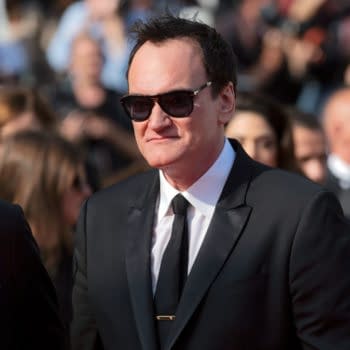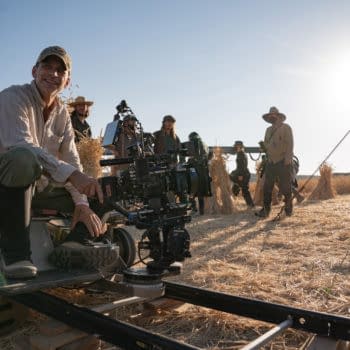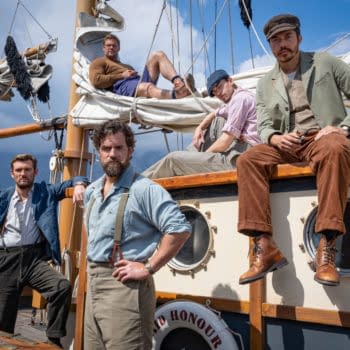Posted in: Movies, Video Games | Tagged: Assasin's Creed: Unity, bioware, diversity in gaming, entertainment, gaming, gender in gaming, knights of the old republic, KOTOR, mass effect, Tomb raider, ubisoft, video games
The Search For The Female Assassin: An Argument For More Diversity In Gaming
By J. Michael Neal
In recent years, Marvel has shaken the status quo by crowning Pakistani-American Kamala Khan the next Ms. Marvel and granting biracial teen Miles Morales the mantle of Spider-Man. In July, Marvel made headlines yet again by bringing even more diversity into their core lineup. It was revealed that within their Marvel NOW! imprint Captain America will return to his retconned African American roots as the hero formerly known as Falcon takes up the iconic shield, and after the current thunder god abdicates Mjolnir a female warrior will take on the role of Thor, giving Leia a run for her money as the new coolest Disney Princess. While the news was met with the expected amount of cynicism and internet troll hate-mongering, Marvel's continued efforts to branch beyond the white male hero have been met with overwhelmingly positive responses and continued commercial success.
This, however, contrasted sharply with the dialogue that has dominated gaming forums since this May's E3. Ubisoft stirred a hornet's nest after proclaiming that the next Assassin's Creed game will not give players the option to create a female protagonist, as doing so would amount to an unacceptable level of work for the development team. While many (including, most obviously, Ubisoft themselves) failed to see the issue at hand, a large segment of the series' fanbase, as well as the gaming community as a whole, have been understandably outraged. In this day and age, how could a company as large as Ubisoft so easily write-off half the world's population? As Bioware makes efforts to correct past frictions with the LGBT community, has Ubisoft become they the new face of bigotry in game development?
A closer look at the series tells a different tale. To the contrary, Assassin's Creed has always been a beacon of diversity in the gaming world. We are talking about a flagship franchise that has told the stories of a Muslim during the Crusades, a Native American during the American Revolution, a half-French half-African female in 1800s Louisiana, and an African slave turned freedom fighter just to name a few. Every game in the series opens with a splash screen that proclaims the following was "designed, developed, and produced by a multicultural team of various religious faiths and beliefs" – a statement that can be read as much as a preemptive self-defense as it is a point of pride. It is for this reason, perhaps, that Ubisoft's dismissal of the female voice this time around has felt like such a betrayal.
The importance of the inclusion of female characters in gaming cannot be overstated. Late film critic Roger Ebert, who became a divisive figure in the community after stating that video games will never be considered "high art", once described movies as a "machine that generates empathy" by allowing viewers to see different perspectives of the human experience. Video games, as an interactive medium, take this concept one step further. The viewer becomes the player, not just vicariously empathizing with another, but actively existing inside an avatar – feeling, thinking, reacting as someone else. It is important for the faces in video games to be as diverse as the audience that plays as them, but it is even more important to guide someone through an experience that they may not otherwise have access to, or be able to understand.
I can recall playing Tomb Raider during the gentler and more angular days of the PlayStation era. It may not seem revolutionary now, but for a pre-teen male to step into the tank top and short-shorts of the iconic Lara Croft for the first time… it took some mental adjustment. I can remember the start of our journey together. It felt like issuing commands to an odd little marionette. I would tell her to turn left, turn right, jump, dive, and roll through my pad. It didn't help that the game's controls and camera were lumbering and unresponsive. Over time, however, as we worked together to overcome the game's brutal and cavernous labyrinths, my bond with the silent protagonist grew, and by the end of the adventure I didn't have to think about it anymore. There was no me and her, we were one. I was Lara Croft and I beat the game. While the origin of the character is surprisingly sexist, the effects of playing from a female perspective, even one limited to a simple visual representation, was so successful I have chosen to play as a female character when given the option ever since.
Flash forward to 2013's reboot of the franchise to find one of the best cases for the importance of female protagonists I've ever seen. While Lara and I are old friends now, finding myself in her reimagined boots became one of the most affecting experiences I've had playing a game. It wasn't because of the narrative, or the amazing graphics, or excellent gameplay, but because it was the first time I ever really felt like I experienced existence in the body of a female. And it was terrifying.
The game, which acts as an origin story, finds everyone's favorite raider of tombs young, inexperienced, and helpless. Stranded on an island where survival is a violent, constant struggle, the game traces Croft's transformation from bubbly, run-of-the-mill heiress to tough-as-nails-heroine. While this premise alone is enough to make the experience pretty powerful, what stuck with me, and made the game almost unbearably stressful, was the constant, implicit threat of sexual violation against my person.
It's a fear that, sadly, becomes incorporated into the daily existence of women around the world from a disturbingly young age. It is a fear that, as a six foot four black male, enters my mind never. However, as wounded, vulnerable, and barely clothed Lara Croft, who is often unarmed and surrounded by dozens of violent and angry men, who seems to be at the mercy of everyone and everything around her, I genuinely feared that the game would eventually "go there".
And it did. And it was a moment that rivaled the scariest survival horror games out there for controller-gripping terror.
Now I didn't need Crystal Dynamics to teach me that rape is wrong, or to allow me to feel empathy for women, or to even have an understanding of what the female experience must be like, but having a tangible and visceral 30+ hour emotional journey can be pretty damn affecting. Wondering which males I could and couldn't trust, who I could let my guard down around, what the wrong man would do to me if he caught up to me, of only feeling safe around other females – not just watching it happen to someone, but having it happen to me. Having my brain think and react to the situations as if I were in the middle of them. It was terrifying.
But this was something I could escape by simply turning the game off. If it got too stressful, too much to bare, I could just return to the real world and everything will be fine. The transformative moment happened when I realized that, for women the world over, turning the game off is when the real danger begins. It's a danger that starts from birth and follows them until the day they die. And if tasting that for the first time as a cis male doesn't change your thinking even a little, I don't know what to tell you.
And while I'm sure the cooperatively driven Assassin's Creed: Unity would be considerably less heavy even with female player characters, would being a female assassin fighting alongside her male counterparts (as have been present in the series since Brotherhood) be any less affecting? My African American female Jedi in Knights of the Old Republic said not a word, and was treated no different than any other version a person made, but my experience of the Star Wars universe through her lens was different. It couldn't help but be.
When Bioware followed up the KOTOR series with the monolithic Mass Effect, the option to play as a female became a no-brainer. Why? Because the thought of saving the galaxy as the bald, white, hulking bro on the cover seemed absolutely boring to me. But suddenly, the role of being a rogue Specter agent who must singlehandedly rally a galaxy against an alien threat bent of total annihilation of all life as we know it took on new shapes and dimensions when she became the half-white, half-Asian army brat I would go on to spend close to 300 hours with over the course of the trilogy.
And while, like in KOTOR, the narrative wasn't incredibly different for my Femshep as my friend's male Shepard, aside from some romance options along the way, my experience of Mass Effect was entirely different. The decisions I made were different, my relationships to the crew were different, the way I approached conflicts and moral dilemmas were different because the way I saw myself was different. And for this reason, game developers need to take a cue from Marvel, because despite what Ubisoft's cost-benefit analysis number crunchers may think, expanding the diversity options in games is worth the extra time and expense, not just for gamers, but for society as a whole. Seeing the world through someone else's eyes, and seeing yourself in someone else's skin, is an important tool for permanently changing perspectives. And what are video games but an invitation to spends dozens, if not hundreds, of hours as someone else?
J. Michael Neal (https://twitter.com/jmpnr) is a screenwriter, novelist, and game critic out of Philadelphia, PA. He enjoys beef jerky and the comic stylings of Gallagher.






















